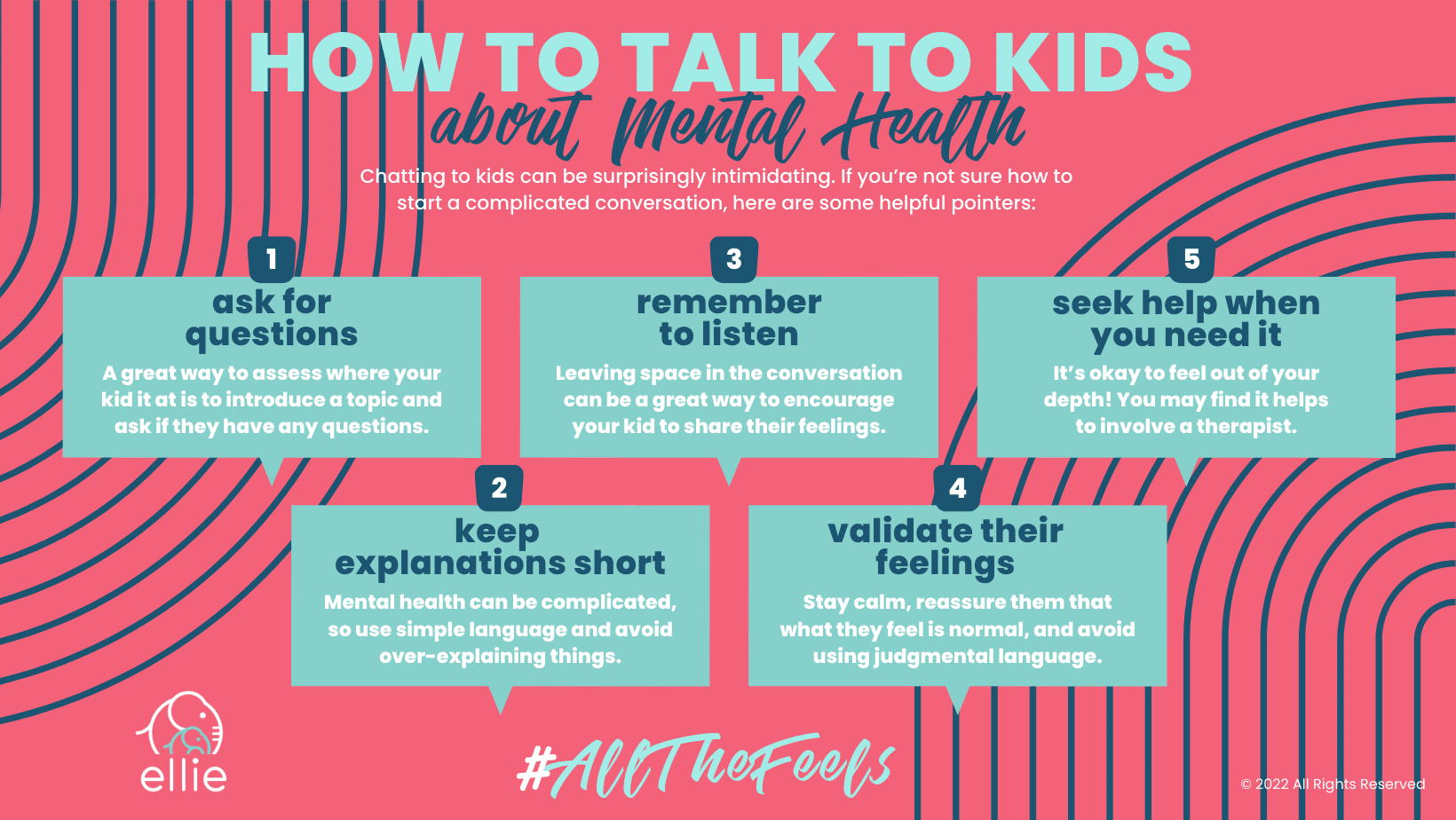At Ellie Mental Health, we believe that therapy should be the norm. When things are tough, it’s a great way to look after yourself and develop a plan to optimize your mental health. Even when things are great, and you’ve got your life together, it can be really beneficial to check-in with an expert to make sure things stay on track. That all applies just as much for kids as it does for adults.
But how do you talk to your kids about mental health? How do you introduce concepts such as anxiety or depression? How do you help them process BIG emotions? How do you help them survive bullying? How do you help them through difficult times or big life changes? What do you do if they ask you a question and you don’t know the answer? It can be incredibly intimidating.

Don’t worry, we’ve got you. Here’s a helpful guide to talking mental health with your kids.
Totally out of your depth? Get matched with a therapist today.
Normalize Mental Health for Your Kids
Counseling isn’t new. However, there is still a stigma around it. For many people, seeking help can be uncomfortable and even scary. For many of us, that perception starts in childhood, because we’re conditioned to associate negative language with mental illnesses and mental health support. It might start with nasty words such as “nuts,” “crazy,” “psycho,” or “unhinged.” However, it can also include common terms such as “perfectionist,” “control freak,” or “wet blanket.” None of them are helpful.
Breaking that stigma, and teaching your kids to be mentally healthy, starts with early exposure. It’s like taking your kids to the dentist. If they start getting check-ups from a young age, it normalizes good oral hygiene practices and prepares them for a lifetime of great dental care. The same principle applies to therapy, because it normalizes the process and ensures your kids are comfortable with it.
Mental health support comes in lots of different formats. Your child may benefit from individual therapy, however, it’s also worth considering family therapy. This will make sure everyone is on the same page about mental health terminology and best practice. A therapist can also help you boost communication, address issues, and answer any curly questions that arise during the session.
Check out our other blog for more way to begin mental health conversations.
Introduce Good Mental Health Practices at Home
There are lots of great ways parents can introduce good mental health practices at home.
The secret is to make it an everyday thing rather than waiting for big moments, complicated issues, hurt feelings, or important conversations to arise. That way, your kids will be open to discussing their thoughts and feelings with you and equipped with the words they need to describe what’s going on.
Here are four of our favorite ways to talk to your kids about mental health.
1. Educate Yourself about Mental Health Basics
Parenting is like drinking from a fire hydrant. It’s a lifelong educational journey that gets increasingly complex as your kids age. The best way to start promoting good mental health at home is to make sure you understand the basics. What is depression? What is anxiety? What physical factors impact mental health? What emotional factors impact mental health? What are the most common pediatric and adolescent mental health issues? What are red flags that may indicate a mental health issue?
You might find it’s helpful to chat to friends with kids, seek out parenting groups in your local area, or track down some resources online. You can also prepare yourself for the challenges that lie ahead by chatting to a therapist. Find someone who specializes in counseling kids and families and ask their advice. They’ll be able to help you understand key issues, prepare you for the types of issues you’re likely to encounter, and develop strategies that can help you guide your kids in the right direction. And of course, if things ever hit the fan, you’ll already have an expert on speed dial.
2. Introduce Mental Health in a Casual and Relatable Way
A really easy way to introduce mental health concepts is to talk about them while you’re reading books or watching cartoons with your kids. As the story progresses, pause and ask your kids what they think the main characters are thinking and feeling. This will help them learn concepts such as happiness, sadness, stress, anger, confusion, and joy, and how to identify them in real life.
You can also take it a step further by asking why they think the character is feeling this way. That will help them understand cause and effect as well as which factors trigger different emotional responses. How would your child respond in this situation? If something positive happened, how would they acknowledge it? If something negative happened, how would they respond?
Conversations such as these serve a few purposes. First, they make mental health relatable and relevant. Second, they start preparing your kids with the tools they’ll need to respond to different situations in life. Third, they make mental health an active concept instead of a passive one, which will help them develop a proactive approach to looking after their mental health.
3. Talk About the Ways Mental Illness Affects People
Kids are incredibly observant and they can ask some really challenging questions as they learn to understand the world around them. Every parent has faced a head-scratcher from time to time. What is space? Does the letter W start with a D? Why is grandma sleeping in the ground? Do mermaid fingers prune? And yes, natural curiosity comes with straightforward and observational questions. We’ve all fielded at least one of these asked *VERY LOUDLY* at an incredibly inopportune moment.
The types of questions they’ll ask will change as your kids develop. This is what the American Academy of Child and Adolescent Psychiatry (AACAP) says parents can typically expect:
- Preschool-aged kids: Questions are typically based on what kids can see, such as unusual physical appearances or unusual behaviors. Kids this age are usually satisfied with short and simple answers, so you don’t need to add lots of information or explore complex nuances.
- School-aged kids: Kids this age tend to want details. They might start asking questions about specific people in their lives, such as friends or family members, and they are typically very direct. As an example, the AACAP says: “Why is that person crying? Why does Daddy drink and get so mad? Why is that person talking to herself?” They may also express concern as to that person’s welfare or to their own. In this case, it’s important to validate their concerns and answer their questions as succinctly, honestly, and directly as you can.
- Teenagers: Once your kid enters their teens, they’ll be able to handle a lot more information and understand issues on a much deeper level. At this age, they often have a close circle of friends and they are strongly influenced by the people around them, which means they may begin to develop negative associations around mental health. The AACAP recommends having regular open dialogues with plenty of give and take. You can definitely expect to be frustrated at times, but this is where early exposure and a strong family culture will pay off.
4. Model Good Mental Health Behaviors
Kids learn by watching their parents, so a great way to promote healthy habits in your offspring is to make sure you prioritize your own mental health and communicate it to your family members. For example, if you’re currently in therapy, tell your kids you’re seeing your therapist instead of just telling them you have a vague “appointment.” If you’re stressed out, feeling depressed, or struggling with anxiety, verbalize it to your kids – you don’t have to go into detail, but attaching a label to it can help them understand what it is and recognize the symptoms. If you’re engaging in self-care, let them know and explain that it’s important because it helps you feel happy and healthy. That will help your kids learn that mental health terms and mental health care are normal parts of life.
You can also talk to your kids about mental health as part of your routine. For example, if you’re all snapping at each other, tell your kids it’s time for a mental health break and take them to the park to burn off some steam. Or when you’re sitting around the dinner table, check in with each family member to ask how they’re feeling, what was hard, and what they’re grateful about today.
That’s just a start, but before we know it, we’ll have raised a happy and healthy generation who can discuss their mental health without any fear of stigmatization whatsoever. It’s going to be awesome.
Ready to help change the culture of mental health? Us too! The therapists at Ellie Mental Health are ready and waiting to help you talk to your kids about mental health. Let’s get started.


